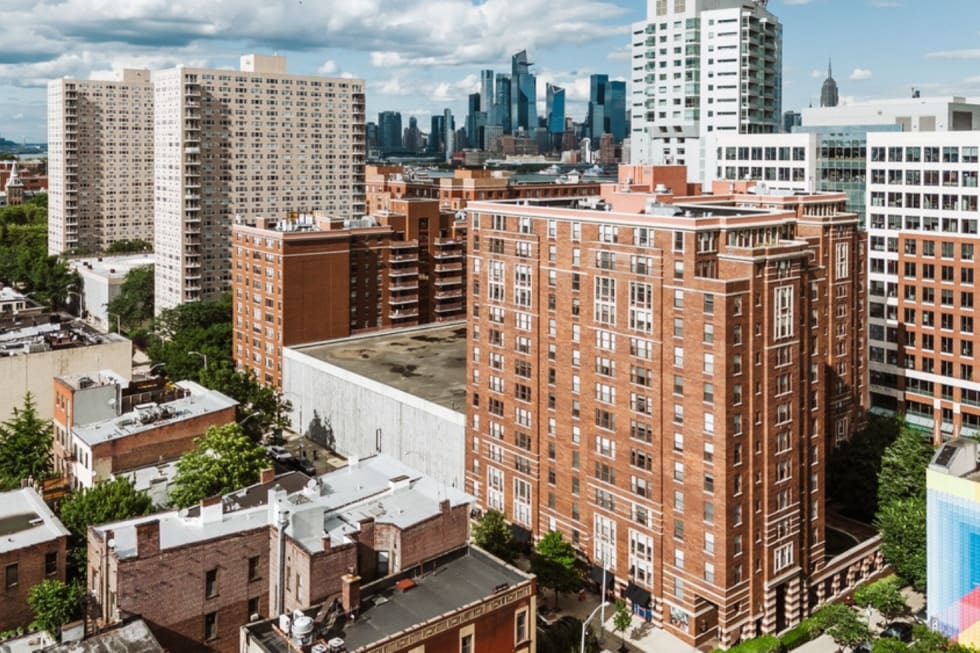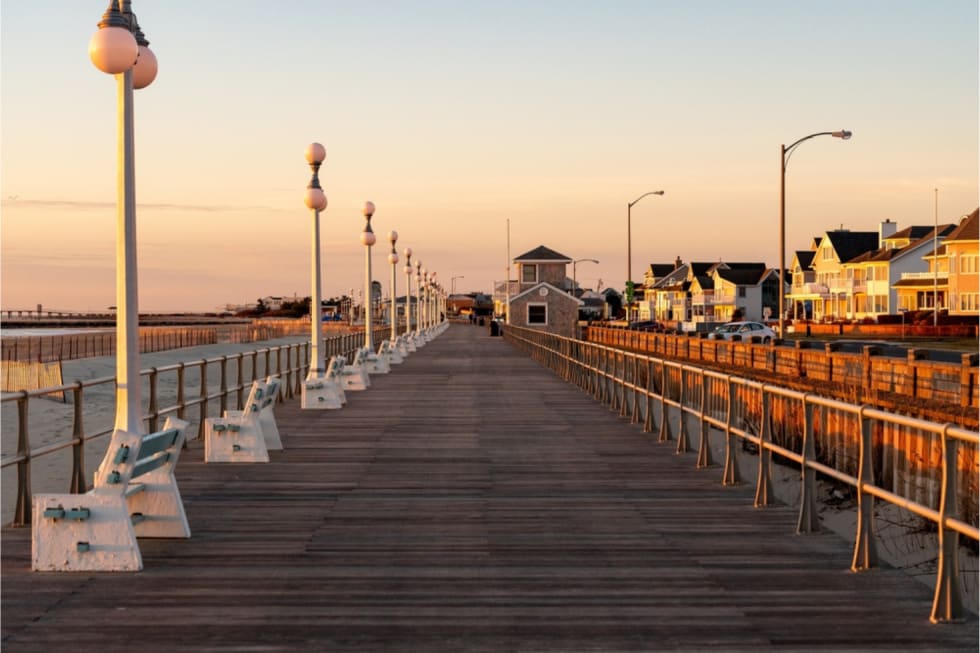Cost of Living in New Jersey [2025]

New Jersey is a popular place to live as it combines suburban tranquility with urban accessibility. The Garden State boasts diverse communities, proximity to major metropolitan areas like New York City and Philadelphia, and a long, beautiful coastline. Residents enjoy access to top-tier education institutions, a variety of recreational activities, and a thriving job market. However, these amenities come with a cost, as New Jersey's overall cost of living is higher than the national average.
When compared to cities like New York or San Francisco, New Jersey provides a relatively affordable alternative while still offering access to similar urban benefits. Nonetheless, potential residents should be aware of the state's higher housing costs and property taxes. Exploring various regions within New Jersey can reveal more affordable options that still provide a high quality of life.
Cost of Living in New Jersey
What Is the Cost of Living in New Jersey?
As of 2025, the average cost of living index in New Jersey stands at 119.8, indicating that it is 19.8% higher than the national average. Housing is the most significant factor, with an index of 136, which is more than 30% above the U.S. average. Healthcare and utilities are also above average at 107.5 and 109.2, respectively.
The cost of living can differ widely depending on where in New Jersey you choose to live. Northern cities like Jersey City and Hoboken are among the most expensive, driven by high housing prices and proximity to New York City. In contrast, more affordable areas like Camden and Vineland offer significant savings. For example, Camden’s overall cost of living index is 94, well below the state average, with housing indexed at just 28—nearly 70% below the U.S. norm. Similarly, Vineland features lower housing and utility costs, making it an attractive option for budget-conscious residents.
| Cost of Living | New Jersey | U.S. |
|---|---|---|
| Overall | 119.8 | 100 |
| Grocery | 105.8 | 100 |
| Health | 107.5 | 100 |
| Housing | 136.4 | 100 |
| Median Home Cost | $427,600 | $414,500 |
| Utilities | 109.2 | 100 |
| Transportation | 105.6 | 100 |
| Miscellaneous | 112.5 | 100 |
Where Is the Cost of Living Highest in New Jersey?
Hoboken and Jersey City share the same overall cost of living index at 139.5, placing them well above the national average of 100. However, rental prices reveal distinct differences between the two. In Hoboken, renters can expect to pay an average of $4,447 per month, which is significantly higher than in most parts of the state. One-bedroom apartments average $3,573, while two-bedroom units reach around $5,048. Jersey City, by comparison, is slightly more affordable, with an overall average rent of about $3,846. A one-bedroom apartment rents for an average of around $3,573, and a two-bedroom averages $4,391.
While both cities are considered high-cost, Hoboken tends to skew more expensive due to its boutique feel, limited space, and proximity to Manhattan. Jersey City, on the other hand, offers a broader range of rental options across its neighborhoods. These differences highlight how lifestyle, location, and neighborhood dynamics can significantly impact your cost of living, even when overall city scores appear to be the same.
| Cost of Living | Hoboken | New Jersey | U.S. |
|---|---|---|---|
| Overall | 139.5 | 119.8 | 100 |
| Grocery | 111.1 | 105.8 | 100 |
| Health | 98.3 | 107.5 | 100 |
| Housing | 246.3 | 136.4 | 100 |
| Median Home Cost | $872,100 | $427,600 | $414,500 |
| Utilities | 110.7 | 109.2 | 100 |
| Transportation | 127.7 | 105.6 | 100 |
| Miscellaneous | 112.8 | 112.5 | 100 |
Where Is the Cost of Living Most Affordable in New Jersey?
Vineland offers a notably affordable cost of living compared to both state and national averages. With an overall cost of living index of 85.6, expenses in Vineland are 14.4% lower than the U.S. average of 100 and 34.2% lower than New Jersey's average of 119.8. Housing is a significant contributor to this affordability, with an index of 70.3, indicating that housing costs are substantially lower than both the national and state averages.
It offers residents quiet neighborhoods and expansive farmland, providing a serene retreat from the hustle and bustle of larger metropolitan areas. The city features convenient shopping plazas and local markets, ensuring that daily necessities are easily accessible without the congestion often found in more densely populated regions.
| Cost of Living | Vineland | New Jersey | U.S. |
|---|---|---|---|
| Overall | 85.6 | 119.8 | 100 |
| Grocery | 102.4 | 105.8 | 100 |
| Health | 96 | 107.5 | 100 |
| Housing | 70.3 | 136.4 | 100 |
| Median Home Cost | $218,200 | $427,600 | $414,500 |
| Utilities | 109.5 | 109.2 | 100 |
| Transportation | 127.7 | 105.6 | 100 |
| Miscellaneous | 96.4 | 112.5 | 100 |
How Much Is a One-Bedroom Apartment in New Jersey?
As of early 2025, the median rent for a one-bedroom apartment in New Jersey is $2,016, but prices vary widely by city. Hoboken tops the list at $3,746, followed closely by Jersey City at $3,573, while more affordable options can be found in Vineland and Trenton.
Neighborhoods also make a difference—luxury buildings in Jersey City's waterfront areas start much higher, while more modest spots in Camden or Demarest offer lower entry points. Rent prices fluctuate depending on location, amenities, and demand, so it’s worth comparing neighborhoods before signing a lease.
| City | Rent |
|---|---|
| Hoboken | $3,746 |
| Jersey City | $3,573 |
| Demarest | $2,600 |
| Newark | $2,318 |
| Camden | $1,977 |
| Trenton | $1,450 |
| Vineland | $1,350 |
How Much Is a Two-Bedroom Apartment in New Jersey?
As of 2025, the median rent for a two-bedroom apartment in New Jersey is $2,598, but prices swing widely depending on the city. Hoboken leads with a steep $5,048 average, followed by Jersey City at $4,391. On the more affordable end, Vineland averages $1,450 and Trenton $1,520. Even within cities, prices can shift depending on the amenities and neighborhoods, so it’s worth doing an in-depth comparison before committing.
| City | Rent |
|---|---|
| Hoboken | $5,048 |
| Jersey City | $4,391 |
| Demarest | $2,710 |
| Newark | $2,691 |
| Camden | $2,420 |
| Trenton | $1,520 |
| Vineland | $1,450 |
How Much Is Housing in New Jersey?
As of early 2025, the median home price in New Jersey has experienced a significant increase, reaching approximately $565,000—a rise of over 11% compared to the previous year. In Newark, the state's most populous city, the housing market has also seen notable growth. In December 2024, the median listing home price was $427,600, reflecting a 13.1% year-over-year increase. These figures indicate a robust upward trend in home values across both the state and its largest city.
What Salary Do I Need to Live in New Jersey?
The 30% rule for rent is a widely recommended guideline suggesting that individuals allocate no more than 30% of their gross income to housing costs, including rent and utilities. This principle aims to ensure that sufficient income remains for other essential expenses such as food, transportation, and healthcare.
As of early 2025, the median monthly rent in New Jersey is approximately $2,016. According to the 30% rule, renters should aim to spend no more than 30% of their gross income on housing, which means you’d need to earn about $80,640 per year, or $6,720 per month, to afford the median rent without financial strain. That breaks down to an hourly wage of approximately $38.77, assuming full-time employment at 40 hours per week.
For context, the median household income in New Jersey is $101,050, which is higher than the national median of $80,610. While New Jersey's median income is relatively high, the state's living costs are also substantial. According to the MIT Living Wage Calculator, the living wage for a single adult in New Jersey is estimated at $24.76 per hour, covering basic necessities like housing, food, and healthcare but not accounting for expenses such as travel, savings, or debt repayments. To assist in finding apartments within your budget, consider using our rent calculator.

How Much Is Transportation in New Jersey?
Transportation in New Jersey can be a costly and time-consuming part of daily life, especially for those reliant on personal vehicles. According to the MIT Living Wage Calculator, the annual transportation cost is approximately $9,700 for a single adult and $16,271 for a household with two working adults and two children. These figures reflect the state’s car-centric infrastructure, where driving remains the most common and, in many cases, the only viable option due to limited transit access and service quality.
New Jersey's public transportation network, particularly NJ Transit, offers broad coverage but faces criticism for infrequent service, confusing fares, and limited integration across systems. While the infrastructure is built to funnel commuters into New York City or Philadelphia, it often fails to meet the day-to-day needs of residents traveling within the state.
In Newark, where public transit is more viable, the Walk Score is 76, the Transit Score is 65, and the Bike Score is 51, making it one of the more accessible cities for those without a car. Neighborhoods like Ironbound or Downtown Newark offer better access to buses, trains, and rideshares.
How Much Are Groceries in New Jersey?
According to the MIT Living Wage Calculator, the annual food cost for a single adult in New Jersey is approximately $4,667, while for a family of four (two adults and two children), it amounts to about $13,680.
Dining out in New Jersey, particularly in cities like Newark, can significantly impact one's budget. According to Numbeo, as of January 2025, the average cost for a three-course meal for two at a mid-range restaurant in Newark is around $80. Inexpensive restaurant meals average about $19 per person. Grocery prices also contribute to the overall cost of living; for instance, a loaf of fresh white bread (1 lb) costs approximately $3.99, and chicken fillets (1 lb) are about $6.99.
New Jersey's diverse culinary scene offers a variety of local dishes, such as pork roll sandwiches and tomato pies, which are integral to the state's food culture. While indulging in these local specialties and dining out can enhance one's lifestyle, frequent restaurant visits can substantially increase monthly expenditures. Balancing home-cooked meals with occasional dining out can help manage food costs effectively, allowing residents to enjoy local cuisine without straining their budgets.

How Much Is Child Care in New Jersey?
According to the MIT Living Wage Calculator, the annual childcare cost per child in New Jersey is approximately $17,124. To mitigate these expenses, parents can explore various strategies. Coordinating work schedules to allow for remote work or flexible hours can reduce the need for full-time childcare.
Additionally, researching neighborhoods with lower childcare costs or shorter waitlists can lead to more affordable options. Engaging in childcare cooperatives or sharing responsibilities with other families may also help manage and reduce overall childcare expenses.
How Much Is Healthcare in New Jersey?
According to the MIT Living Wage Calculator, annual healthcare expenses in New Jersey are approximately $3,942 for a single adult and $10,749 for a family with two working adults and two children. This indicates that families can expect to pay nearly three times more in healthcare costs compared to single individuals, reflecting the added expenses associated with covering multiple family members.
How Much Are Utilities in New Jersey?
Monthly utility expenses in New Jersey can vary based on location and usage. For a 915-square-foot apartment, basic utilities—including electricity, heating, cooling, water, and garbage—average around $189.80 in Newark, which is lower than the national average of $208.79 for similar utilities.
New Jersey's climate, characterized by cold winters and hot, humid summers, can lead to fluctuating utility costs due to increased heating and cooling needs. For instance, during peak summer months, air conditioning usage may significantly raise electricity bills. Residents should anticipate these seasonal variations and consider allocating additional funds in their budgets to accommodate higher utility expenses during extreme weather periods.
New Jersey Fitness and Entertainment
Fitness and entertainment costs in New Jersey can add up quickly, especially in cities like Newark. A monthly gym membership averages around $45, which is more affordable than in places like New York City ($150+) but is still a recurring expense to consider. Movie tickets for an international release are about $15 per person, making a family night out potentially pricey.
That said, New Jersey is full of free and low-cost ways to stay active and entertained year-round. Popular outdoor destinations include Liberty State Park, offering skyline views and open space for walking or biking, and Voorhees State Park, which features scenic hiking trails and a public observatory. The Delaware and Raritan Canal State Park Trail stretches over 70 miles and is perfect for running or cycling. For budget-friendly entertainment, explore Branch Brook Park’s famous cherry blossoms or visit the Cathedral Basilica of the Sacred Heart, both of which are free to the public and offer unique experiences without the price tag.
How Much Are Taxes in New Jersey?
New Jersey's tax system ranks 49th on the 2025 State Tax Competitiveness Index, indicating a challenging tax environment for residents and businesses. The state imposes a graduated individual income tax with rates ranging from 1.4% to 10.75%, with the top rate applied to incomes over $1 million.
Notably, New Jersey has the highest per capita property tax collections in the nation, contributing significantly to the overall tax burden. These factors collectively influence the state's high cost of living, making it essential for residents and businesses to consider tax implications in their financial planning.
New Jersey’s Job Market
As of early 2025, New Jersey's job market continues to grow steadily, with the state adding nearly 45,800 new jobs over the past year, ranking it 20th in the U.S. for job growth in 2024. Much of this growth has come from industries like education and health services, transportation and warehousing, and professional and business services, which remain among the top employers across the state. Healthcare, in particular, is a major economic driver, with hospitals and outpatient centers continuing to expand hiring to meet demand.
Despite this progress, New Jersey’s unemployment rate held steady at 4.6% in February 2025, slightly higher than the national average of 4.1%. Industries such as financial services and information technology have seen slight employment declines, reflecting broader national trends of consolidation and automation. Still, with more than 4.4 million jobs statewide and continued investment in logistics, healthcare, and clean energy, New Jersey's job market remains resilient and diverse.
Find Your Next Apartment in New Jersey
New Jersey offers a diverse range of cities and towns, each with its unique charm and amenities, catering to various lifestyles and preferences. Whether you're seeking vibrant urban centers, suburban tranquility, or coastal living, the Garden State has something to offer.
Jersey City stands out for its proximity to Manhattan, excellent transportation options, and a booming job market, making it a prime destination for professionals and families alike. Hoboken offers a blend of historic brownstones, a vibrant arts scene, and scenic waterfront views, appealing to those seeking a lively community with easy access to New York City. For a more suburban feel, Princeton provides a rich cultural scene, top-rated schools, and the prestigious Princeton University, making it ideal for families and academics. Newark, the state's largest city, presents a promising market with affordable housing options and a growing economy, attracting both investors and new residents. Coastal towns like Asbury Park have transformed into vibrant communities known for their eclectic charm, music scenes, and beachfront attractions.
New Jersey's affordability, entertainment options, and year-round recreational opportunities make it a comfortable place to live, work, and play. With the right approach, you can find an apartment in New Jersey that meets your needs, whether you're moving from out of state or just across town.
Ready to find a new apartment? Get started on your New Jersey apartment search with Apartment List. With us, you’ll spend five minutes and save 50 hours searching.
FAQs about Cost of Living in New Jersey
How expensive is an apartment in New Jersey?
As of 2025, the median rent for a one-bedroom apartment sits at $2,016, with prices climbing significantly in popular cities—Hoboken averages $3,746, and Jersey City comes in at $3,573. More affordable options can be found in Trenton ($1,450) and Vineland ($1,350).
Is it expensive to live in New Jersey?
Living in New Jersey can be expensive, especially in areas like Hoboken and Jersey City, where housing costs and overall living expenses are significantly higher than the national average. The state's overall cost of living index is 119.8, driven primarily by housing, which sits at an index of 136.4. However, affordability varies across the state. While upscale urban hubs near New York City demand higher rents and home prices, cities like Camden, Trenton, and Vineland offer far more budget-friendly options without sacrificing access to essential amenities.
What is the minimum wage in New Jersey?
While New Jersey's minimum wage reached $15.49 per hour in 2025, this still falls short of what’s considered a living wage in the state. According to the MIT Living Wage Calculator, a single adult in New Jersey needs to earn at least $24.76 per hour to cover basic necessities like housing, food, and healthcare.
How many people live in New Jersey?
As of July 1, 2024, New Jersey’s estimated population is 9,500,851, according to the U.S. Census Bureau.
Is New Jersey a good place to live?
New Jersey offers a wide range of living experiences—from the academic charm of Princeton and urban appeal of Jersey City and Hoboken to the suburban calm of Ridgewood and coastal beauty of Oceanport—making it ideal for all lifestyles.
Share this Article



